Elevate your local knowledge
Sign up for the iNFOnews newsletter today!
Sign up for the iNFOnews newsletter today!
Selecting your primary region ensures you get the stories that matter to you first.

BC jails are short on staff and it means some prisoners are waiting a long time for programs meant to reduce re-offending if they can get in at all.
That’s according to the province’s new Investigations and Standards Office, which oversees provincial correctional centres.
The BC Ombudsperson’s Office recommended the province install the oversight agency eight years ago and its first report was issued last month, finding eight of the ten BC correctional facilities are struggling with staffing shortages, while only half of its inmates felt their time in custody has been “beneficial.”
Those staffing shortages were largely blamed for inconsistent documentation and programming within the jails, according to the report.
“BC Corrections is working to address the opportunities for improvement that were identified, including those related to staffing shortages and their impact on program delivery,” a spokesperson for Public Safety Minister and Solicitor General Nina Krieger said in a statement.
Where those issues are most prevalent isn’t known and the new oversight body expects to report individually on inspections at all ten facilities in the coming years.
Though the report didn’t address individual jails in detail, one known to be struggling with staffing is also BC’s newest.
The Okanagan Correctional Centre opened in 2017, and the ministry noted it is particularly focused on the Oliver facility as it rolls out hiring campaigns and incentives to retain its staff.
Whether the lack of consistent programming has affected re-offending in BC isn’t clear, but Kamloops city councillor Dale Bass said it is concerning as people may be released without having been treated if, for example, they needed mental health support.
“They are in a correctional environment and this could be just one other way of helping move them forward to correct their mental and physical health issues, to help lead them to a better life,” she said. “The bleeding heart side of me is just screaming at me every time I say that because of Charter rights, but the other part of me is saying the reality here is if we don’t help people, then we’re not doing anything to alleviate the issue.
Statistics from the new report show a disparity among inmates with mental health needs when compared to previous reports.
The oversight body reported 17 per cent of provincial inmates have recognized “mental health needs,” far below figures directly from BC Corrections. According to its own report, 69% of adults in custody have either mental health issues or a substance addiction and 42% have both.
In its own report, BC Corrections said it is “creating a more seamless support system” for inmates with “complex needs” by partnering with other organizations, both within government and outside.
Bass, who sits on a committee connected the local prison, said there are some programs at Kamloops Regional Correctional Centre that appear to be beneficial for preparing inmates for life outside, but many wings of the jail appear to be simply “warehousing” and inmates are left unprepared on release.
“We’ve talking to staff about an exit program because the reality is that when they’re being released, it’s just, ‘bye,'” Bass said. “There’s no continuance of care here. It’s a long process to fix it, but I think it’s doing an adequate job right now.”
The oversight report did note areas of strength at BC jails.
For example, it found a commitment to Indigenous programming across most facilities, positive relationships with staff and inmates and collaborations with health care.
News from © iNFOnews.ca, . All rights reserved.
This material may not be published, broadcast, rewritten or redistributed.

This site is protected by reCAPTCHA and the Google Privacy Policy and Terms of Service apply.
Want to share your thoughts, add context, or connect with others in your community?
You must be logged in to post a comment.